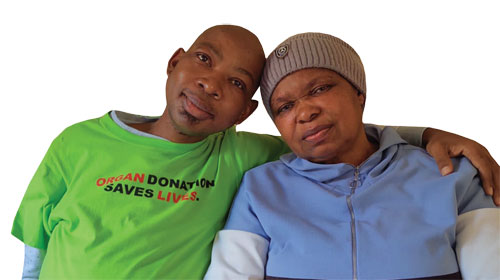Become an organ donor and save lives
In 2016, Kopeli Mosoatsi, a former professional soccer player, received the devastating news that he had kidney failure and needed a kidney transplant.
What followed was a six-year wait for a suitable kidney to be found, which eventually happened last year.
“I cried when I was told that there was a matching kidney. I was ove rjoyed. After the successful transplant I remember, shouting with joy that I was able to pass urine,” said Mosoatsi.
rjoyed. After the successful transplant I remember, shouting with joy that I was able to pass urine,” said Mosoatsi.
One of the side effects of kidney failure is the inability to pass urine.
During the long wait for a kidney, the 38-year-old from Orange Farm in Gauteng had to endure many losses, including his job, friends, some family members and his partner. He recalled that many people in his community also distanced themselves from him.
He relied on his mother’s support over the years.
“She is my pillar. She even left her job to take care of me,” Mosoatsi added.
He said his life changed completely due to kidney failure.
“The journey of kidney failure is not easy at all; you do not wish it even on your worst enemy. Your life changes completely, you start to lose a lot of weight and your appetite, and your body is always swollen.
“You are left with no choice but to depend on dialysis three times a week,” he added.
Mosoatsi started dialysis at Chris Hani Baragwanath Hospital in 2016. The process involves removing waste and excess fluid from the blood when the kidneys are not able to.
Knowing that his transplant would not have been possible if someone had not decided to donate the organ, Mosoatsi urged others, especially black people, to consider organ donation.
He said black people should look beyond the cultural stereotypes associated with donating organs and bear in mind that organ donation saves lives.
“[Some] black people have this belief that when you die, all your organs should be in one place, if not all your ancestors will not recognise you. What they need to consider is that people in need of organs die every day,” said Mosoatsi.
He intends to start a foundation that will educate black people about organ donation.
How to become an organ donor
Sister Anja Meyer from the Department of Health in Gauteng encouraged those interested in organ donation to register with the Organ Donor Foundation.
She added that it is important to inform your family about your wishes as they will need to give their consent at the time of your death.
Meyer, who is a transplant manager for Gauteng, Northwest and Limpopo Public Sector Programmes and chairperson of the South African Transplant Coordinators Society said: “We also encourage people to become altruistic donors, which means you can be a living donor to a family member or a friend.”
Samantha Nicholls, executive director of the Organ Donor Foundation encouraged South Africans to help save lives.
“One organ donor can save seven lives. You can donate your heart, liver, lungs, kidneys and pancreas. Your tissue can help up to 50 more people. Become a donor today - register now,” she said.
*Mosoatsi sadly passed away a week after Vuk’uzenzele conducted the interview. The Mosoatsi family requested that the interview be published in his honour.
May he rest in peace.
To register as a donor, contact the Organ Donor Foundation. Visit: www.odf.org.za or call 0800 22 66 11
Ronnie Mamoepa memory lives on
Deputy President Paul Mashatile has described the late Ronald “Ronnie” Mamoepa as a dear friend, comrade and struggle hero.
The Deputy President spoke at the launch of the Ronnie Mamoepa Foundation held at Freedom Park in Pretoria on 12 July 2023.
The aim of the foundation, is to highlight preserve and promote the positive legacy of the consummate government communicator. The goal of the foundation will be to lead community-based initiatives which are focused on addressing socio-economic challenges facing the country such as poverty, inequality and unemployment.
Deputy President Mashatile told delegates at the event that he shared fond memories with his late friend.
“Ronnie, the griot, was one of the most esteemed Struggle heroes, a defender of freedom and democracy, a seasoned government communicator, and a dedicated public servant,” said the Deputy President.
The theme for the launch was ‘Recommitting the legacy of Ronnie Mamoepa through social activism’. Deputy President Mashatile said the event was a clarion call for all citizens to emulate the undying spirit of selflessness, dedication and humanity that the late spokesperson championed.
“His legacy serves as a beacon of hope for those who continue to carry on his work. It reminds us that even in the face of adversity, we must never lose sight of our shared responsibility to create more equitable and just communities.”
Mamoepa’s last job at the time of his passing in 2017 was spokesperson of the then Deputy President Cyril Ramaphosa.
“It is because of people like Ronnie and Thabo Masebe that today we have the best communication machinery for government through the Government Communication and Information System (GCIS).”
The late Thabo Masebe was a seasoned communicator who previously held the title of Acting Director-General in the Gauteng Premier's office and spokesperson for the former Deputy President Kgalema Motlanthe.
The event also included a wreath-laying ceremony at the Wall of Names at Freedom Park, immortalising the name and legacy of Mamoepa among the esteemed heroes and heroines who contributed to the liberation struggle. They include Chris Hani, Ruth First, Zachariah Keodirelang “ZK” Matthews, Govan Mbeki, Lilian Ngoyi and Charlotte Maxeke.
Deputy President Mashatile commended the GCIS for honouring the fallen hero by renaming their Press Room the Ronnie Mamoepa Media Centre. – SAnews.gov.za



 Facebook
Facebook Twitter
Twitter WhatsApp
WhatsApp